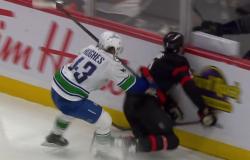
A thousand days. This is the time that elapsed between the start of the Russian offensive in Ukraine, February 24, 2022, and this Tuesday, November 19, 2024. Ten days after the start of the Kremlin offensive, the Council of UN human rights establishes independent commission to investigate Ukraine. His role? Identify potential human rights violations and related crimes committed in this war context.
Today, almost three years after the Russian invasion, the commission’s findings are alarming. In its latest report published on October 25, 2024, in addition to numerous abuses, it records the deaths of at least 11,743 civilians. To establish this assessment, three volunteer commissioners worked tirelessly: Erik Mose, Pablo de Greiff and Vrinda Grover. The last is an Indian lawyer, member of the Supreme Court, recognized for her commitment against sexual violence. Together, they coordinate a secretariat based in Vienna, Austria, which carries out investigations to identify and alert on various human rights violations. Members of the secretariat have traveled to Ukraine on multiple occasions to meet witnesses and victims. “Since 2022, we have interviewed more than 800 people”underlines lawyer Vrinda Grover.
“The presence of sexual violence in 41 detention centers”
At the same time, the information is cross-checked with data from local and international judicial institutions. All elements that can be collected using the Internet are also listed. “It’s a conflict where there is a plethora of information, the difficulty is ensuring their veracity»explains Joël Mermet, coordinator of investigations for the commission secretariat.
Their investigations demonstrated a systemic use of torture by the Russian authorities. These tortures are committed in all provinces of Ukraine which are or have been under the control of the Kremlin. Atrocities which take several forms, including sexual violence against women, men and children. “Evidence of the use of these abuses in the treatment of prisoners of war, particularly against men, has emerged from our research”relates the coordinator, before adding having observed “the presence of sexual violence in 41 detention centers.”
In these detention centers, men – the majority of prisoners – find themselves the main victims of these atrocities. Their testimonies recorded by the commission are extremely violent. Victim says he was beaten while Russian soldier shouted at him : “Nazi! How much do you like it when I kick you in the balls? I’m doing this to you because you castrated our boys! You should be grateful that all I do is kick you in the balls. You dared to attack Russia!” Beyond direct attacks on the genitals, the commission reveals that Russian troops resort to rape, attempted rape, castration and even electrical attacks when leaving the showers to torture Ukrainian prisoners.
For Vrinda Grover, the use of these atrocities constitutes “a war crime” and is done to humiliate, intimidate but above all to extract information. This violence has significant psychological consequences: “Trauma, anxiety, memory loss, difficulty integrating into society and reconnecting with their family at the end of detention.” Joël Mermet has been investigating war zones for around thirty years. He knows that it is common for sexual violence to be used as a means of torture against civilians. “But if I compare with the conflicts I have worked on, I have never witnessed this magnitude. Sexual violence is a characteristic element of this conflict.”
The question of children deported to Russia
The commission tirelessly alerts international and regional organizations. “There are things taken into consideration, we realize that, but is it thanks to our work?” asks Joël Mermet. A question that remains unanswered while many actors work on the ground and identify abuses. “For example, very recently, on the question of children deported to Russia, the commission had recommended that the list which exists and which identifies them be consolidated, and this was done. Ukraine took it over and certified the names listed. But is it thanks to us, or to other more impactful players? It’s hard to say.”
On the issue of sexual violence, international actors are a little helpless. “Victims speak of a need for justice and it is an essential right, abseil Vrinda Grover. Those who perpetrated this violence should be held accountable and punished. Evidence, particularly videos, highlight this violence, and we wrote to the Russian Federation about it, but nothing was done and we received no response.” Russia, which still does not recognize the commission, does not facilitate investigations and still prohibits it from accessing certain areas of its territory.





